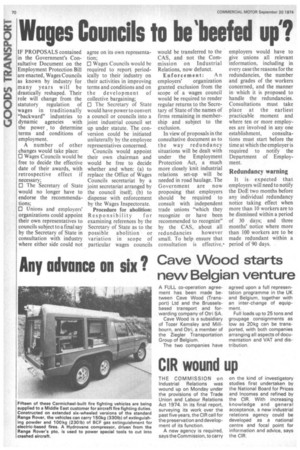Wages Councils to be'beefed up'?
Page 72

If you've noticed an error in this article please click here to report it so we can fix it.
IF PROPOSALS contained in the Government's Consultative Document on the Employment Protection Bill are enacted, Wages Councils as known by industry for many years will be drastically reshaped. Their role will change from the statutory regulation of wages in traditionally "backward" industries to dynamic agencies with the power, to determine terms and conditions of employment.
A number of other changes would take place: CI Wages Councils would be free to decide the effective date of their awards, with retrospective effect if necessary; CI The Secretary of State would no longer have to endorse the recommendations; El Unions and employers' organizations could appoint their own representatives to councils subject to a final say by the Secretary of State in consultation with industry where either side could not agree on its own representation; 0 Wages Councils would be required to report. periodically to their industry on their activities in improving terms and conditions and on the development of collective bargaining; 0 The Secretary of State would have power to convert a council or councils into a joint industrial council set up under statute. The conversion could be initiated unilaterally by the employee representatives concerned.
Councils would appoint their own chairman and would be free to decide whether and when: (a) to replace the Office of Wages Councils secretariat by a joint secretariat arranged by the council itself-, (b) to dispense with enforcement by the Wages Inspectorate.
Procedure for abolition: Responsibility for examining references by the Secretary of State as to the possible abolition or variation in scope of particular wages councils would be transferred to the CAS, and not the Commission on Industrial Relations, now defunct.
Enforcement: An employers' organization granted exclusion from the scope of a wages council would be required to render regular returns to the Secretary of State of the names of firms remaining in membership and subject to the exclusion.
In view of proposals in the consultative document as to the way redundancy situations will be dealt with under the Employment Protection Act, a much more closely knit industrial relations set-up will be needed in road haulage. The Government are now proposing that employers should be required to consult with independent trade unions "which they recognize or have been recommended to recognize" by the CAS, about all redundancies however small. To help ensure that consultation is effect employers would have to give unions all relevant information, including in every case the reasons for the redundancies, the number and grades of the workers concerned, and the manner in which it is proposed to handle the redundancies. Consultations must take place at the earliest practicable moment and where ten or more employees are involved in any one establishment, consultations must start before the time at which the employer is required to notify the Department of Employment.
Redundancy warning
It is expected that employers will need to notify the DoE two months before any individual redundancy notice taking effect when more than 10 workers are to be dismissed within a period of 30 days; and three months' notice where more than 100 workers are to be made redundant within a period of 90 days.




































































































































































































































































































































































